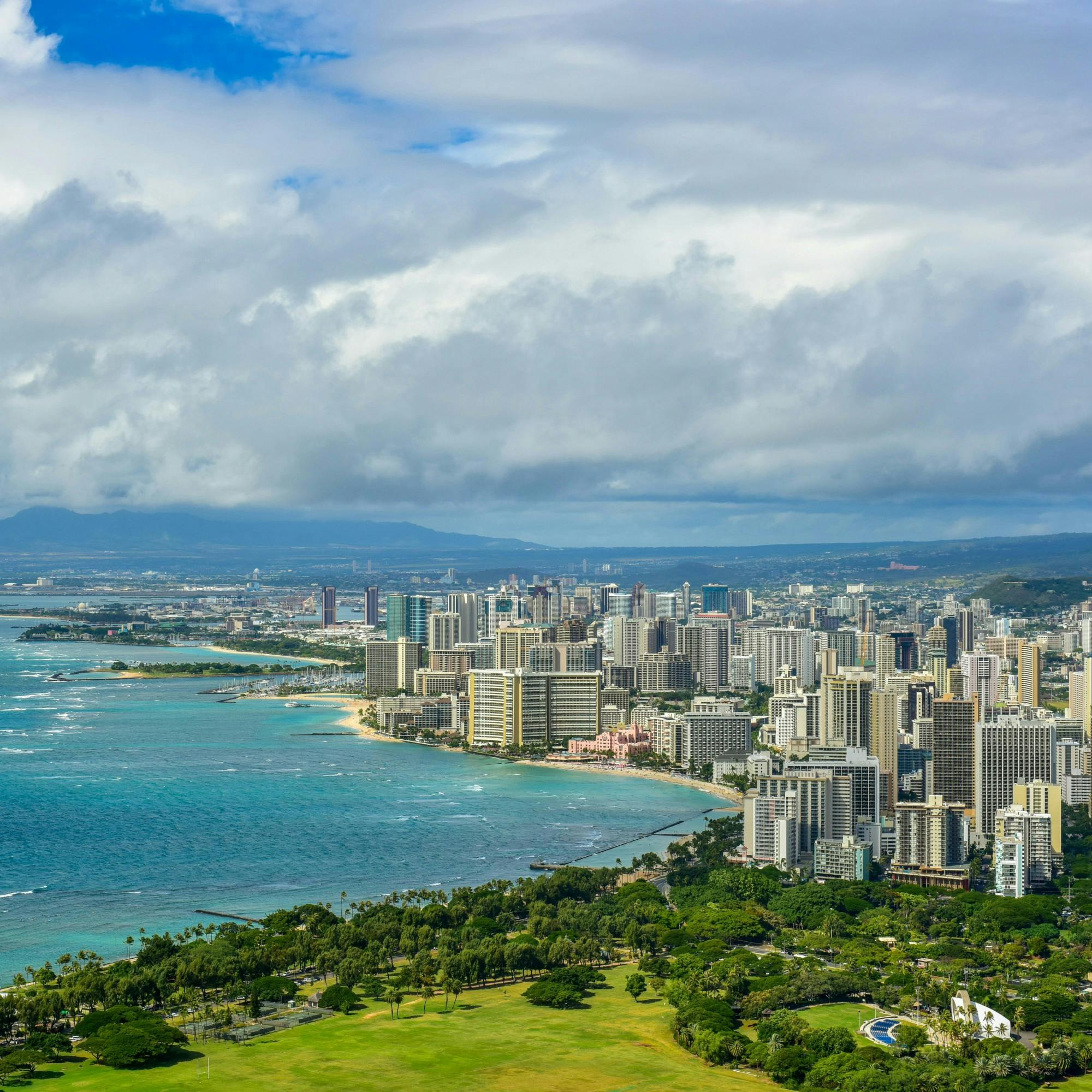
10 Reasons to Run as an Independent in Hawaii’s 2024 Elections
Hawaii is known for its stunning landscapes and rich cultural heritage, but it also boasts a distinctive political climate that makes it ripe for independent candidates. There are multiple issues at stake in the Aloha State, including the effects of climate change, high homelessness rates, land grabs, and the cost of living for islanders.
With the 7th highest percentage of independent voters in the United States at 45.44% and issues that locals feel are being ignored by their representatives, Hawaii presents a unique opportunity for those considering a run for office outside of traditional party affiliations.
As we approach the 2024 elections, let's explore why Hawaii is a fertile ground for independent politics.
Hawaii's Political Landscape
The political environment in Hawaii is uniquely welcoming to independent candidates. Since labor unionization began to figure prominently in Hawaiian industries, the state has been a reliable stronghold for Democratic candidates in federal and state elections. In fact, the Hawaiian Democratic Revolution of 1954 has largely relegated the Republicans to minor party status on the island chain.
The state uses a top-two system for general elections, meaning that the two top vote getters in a primary advance to the general election regardless of party affiliation.
There are currently six recognized political parties, one of which, the Party for Socialism and Liberation, is still in the process of obtaining ballot access for the general elections in 2024:
The Democratic Party of Hawaii
Hawaii Republican Party
No Labels Hawaii
Libertarian Party of Hawaii
Solidarity Party of Hawaii
Party for Socialism and Liberation
Hawaii's electorate has also shown openness to nonpartisan and independent voices at various levels of governance. This openness is reflected in the substantial proportion of voters - nearly half - who identify as independent, underscoring a potential base of support for independent candidates.
In the 2022 midterm elections, 25 independent or third-party candidates ran for state-level positions in various house and senate races. In addition, there were 119 unaffiliated candidates for nonpartisan mayorships and city councils.
The problem is state election rules that mandate nonpartisan candidates to receive at least 10% of the total vote or an equal number of the lowest vote total for a partisan candidate in order to advance to the general elections for state legislative positions. State executive candidates must be registered with a party to qualify.
As a result, many unaffiliated candidates have opted to register with one of the official parties that are recognized in Hawaii. The general consensus is that independent and third-party candidates have better odds of qualifying and making a significant showing when there are other unaffiliated or third-party candidates on the same ballot.
Notable Independent Candidates From Hawaii
The most notable independent candidate in Hawaii is Mufi Hanneman, a former Democratic mayor of Honolulu who ran for governor as an independent in 2014. Independents Adriel Lam and Andrew Kayes both ran for seats in the State House in 2018.
Two candidates that ran in 2022, Brian Ley and Michelle Kwok, were able to meet the tough requirements and advance to the general elections. Calvin Griffin has run for office as an independent multiple times, even receiving 4,381 votes in the 2016 general election for Honolulu’s 1st Congressional District.
Fortunately, things have changed somewhat since these elections. Candidates for non-federal positions are now chosen using a ranked choice voting system, which could help independents and third-party candidates make their mark on politics in Hawaii.
The Case for Independent Candidacy in Hawaii
The fact that voter turnout in Hawaii is small in comparison to the number of registered voters highlights a great deal of dissatisfaction with politics as usual. However, there are other reasons to consider an independent run in Hawaii this year.
Here are 10 of the best:
Reason #1: High Independent Voter Base
With 45.44% of voters identifying as independent, Hawaii offers a large pool of potential supporters who are dissatisfied with the binary choices presented by the two major parties. This demographic is crucial for independents looking to make an impact.
Reason #2: Diverse Political Environment
Hawaii's diverse cultural and political landscape encourages a wide range of perspectives, making it an ideal place for candidates who don’t fit the traditional party molds but resonate with the electorate's values and concerns.
Reason #3: Underrepresented Voices
There is a noticeable gap in representation for various communities within Hawaii. Independent candidates can fill this void by addressing unique local issues that are often overlooked by the national parties.
Reason #4: Responsive to Local Issues
Independents have the flexibility to focus on Hawaii-specific issues such as climate change, indigenous rights, and sustainable tourism without being tied to a national party agenda. This focus can resonate well with voters who prioritize local concerns.
Reason #5: Disillusionment with Partisanship
The national trend of disillusionment with partisan politics is evident in Hawaii as well. Running as an independent allows candidates to capitalize on this sentiment by positioning themselves as alternatives to the status quo.
Reason #6: Grassroots Engagement
Hawaii's community-oriented culture is conducive to grassroots campaigning, which can be a significant advantage for independents who often rely on direct voter engagement rather than large-scale advertising. In fact, the grassroots movement in Hawaii is strong and highly organized.
Reason #7: Innovative Policy Proposals
Without party constraints, independents can propose innovative solutions to issues like housing affordability, energy independence, and environmental preservation, which are critical in Hawaii.
Reason #8: Strong Local Identity
Hawaii's residents have a strong sense of state identity and pride. Independent candidates who embody and champion local values and goals can build a deep connection with voters.
Reason #9: Opportunity for Historic Impact
The bottom line is that Hawaiians, whether potential candidates or voters, are tired of the establishment rule in Hawaii. Running for office as an independent in Hawaii offers the chance to make history by potentially breaking the two-party dominance and bringing fresh perspectives to the political discourse.
Reason #10: National Attention
A successful independent campaign in Hawaii can attract national and even international attention, highlighting the candidate's issues and solutions - as well as those of the communities they represent - on a broader stage.
Offices Up for Election in Hawaii in 2024
At the national level, Hawaii will elect a new Senator and two new Representatives to send to Washington. State offices up for grabs include 13 State Senate seats, 51 seats in the state House of Representatives, and four new Office of Hawaiian Affairs trustees, one each for the counties of Hawaii, Molokai, and Kauai, plus an at-large seat.
Although the state comprises multiple islands, there are only four counties altogether. On the island of Oahu, the state capital of Honolulu, which is also the consolidated County of Honolulu, is looking for a new mayor, prosecuting attorney, and five city council members. The jurisdiction extends to include all northwestern islands except Midway Island.
The County of Maui, which is also spread across several islands, is seeking new council members. There are seven council seats up for grabs in Kauai County, which is also looking for a Prosecuting Attorney. Hawaii County residents will choose a new mayor, Prosecuting Attorney, and nine council members.
Running for Office in Hawaii
For those considering an independent run for office in Hawaii, understanding the unique challenges and opportunities of the state's political landscape is crucial. Engaging with communities, focusing on Hawaii-specific issues, and leveraging the significant independent voter base are key strategies for a successful campaign.
With a variety of seats up for election in 2024, from state legislative positions to local offices, there's ample opportunity for independents to step forward and represent their communities.
Issues Facing Hawaiians in 2024
Due to its location, topography, and cultural significance, a number of issues in Hawaii revolve around climate change and sustainability. Rising homelessness, income inequality, and economic development beyond tourism also impact Hawaii’s population and future prospects.
These issues disproportionately affect the state’s indigenous population and remain a driving force behind Hawaii’s sovereignty movement.
There's also a strong drive to reform Hawaii’s electoral system and diversify representation, which presents another opportunity for input from independents.
Tips for Independent Candidates in Hawaii
Despite a general movement toward independent politics, unaffiliated candidates still face challenges and electoral barriers. For example, the Independent Party of Hawaii has yet to obtain ballot access in the state.
If you’re ready to run for office in Hawaii during the 2024 election cycle, here are some tips to help your campaign succeed:
Emphasize Local Issues: Focus on concerns unique to Hawaii, such as environmental protection, native rights, and economic diversification.
Engage with Communities: Hawaii values personal connections, making community engagement a powerful tool for independents.
Highlight Independence: Use the high rate of independent voters to your advantage by emphasizing your alignment with their values and concerns.
Innovate in Policy: Bring new ideas to the table, especially on issues like sustainable development and renewable energy.
Utilize Digital Platforms: Given Hawaii's geographical spread across the islands, digital and social media are essential for reaching a wider audience.
2024 Election Dates and Deadlines for Candidates in Hawaii
The good news is that there is still time to launch your indie campaign in Hawaii.
The filing deadline for candidates is June 4, 2024. Primaries will be held on August 10, 2024, and the general elections are set for November 5, 2024.
Free Support for Your Independent Campaign in Hawaii
The 2024 elections in Hawaii present a prime opportunity for independent candidates. By tapping into the state's large base of independent voters and focusing on local issues and innovative solutions, independents have a real chance to make a significant impact.
Whether addressing climate change, advocating for social justice, or promoting economic sustainability, running as an independent in Hawaii is not just a political statement - it's a potential catalyst for change. The GoodParty.org team is here to assist you at every step of your campaign, with free campaign tools and expert support. Get a demo of our tools and resources today, and see the difference our support can make in your campaign.
